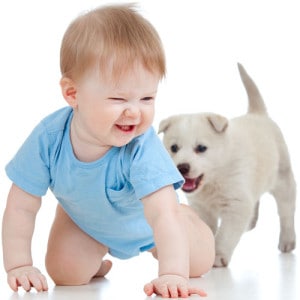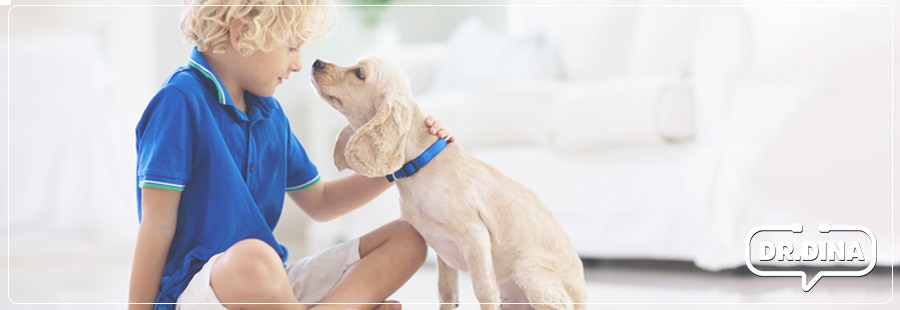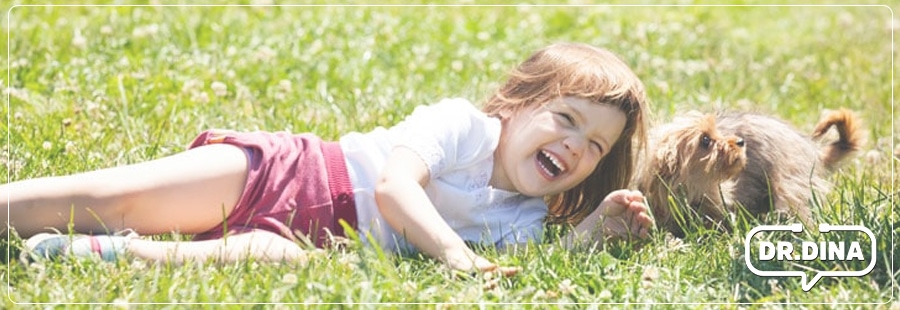Let’s talk about kids and pets!
Kids and Pets: Is It a Good Idea or a Bad One?
I confess I am biased in favor of pets. For us, four kids and three dogs just go together, and, frankly, one dog just wasn’t enough. We like chaos. So when we added a new baby to the family, we added a puppy as well.
 We love our dogs and the companionship and lessons they teach our kids. But we trained our dogs thoroughly and spent many hours insuring their behavior. As a result, I trust them with my kids, and my kids LOVE them.
We love our dogs and the companionship and lessons they teach our kids. But we trained our dogs thoroughly and spent many hours insuring their behavior. As a result, I trust them with my kids, and my kids LOVE them.
There is a wealth of scientific evidence that the unconditional love and affection of an animal promotes health in humans and fosters compassion and responsibility in a growing child. Having a loving pet can increase your well-being, happiness, and life span. Animal visitors in nursing homes and hospitals offer proven health benefits. But not all animals are created equal, and many provide more stress than stress relief.
The Benefits of Kids and Pets
Here is why I think kids and pets are a great match:
Social Benefits
- Responsibility – As soon as they can, I suggest that kids start taking care of the family pet. Walking, feeding, brushing, and cleaning up after their animal friend helps instill a sense of responsibility and pride.
- Self-Esteem – Most companion animals love humans unconditionally, and that is invaluable for young children. No matter what, we know our dogs will be delighted to see us when we return home. We can all benefit from that example!
- Stress – Walking, petting, or brushing your pet has been shown to lower blood pressure and reduce stress levels. Who doesn’t need less stress?
- Companionship – If you get a pet when your children are older, they may still be around when your children move out. Treatment for empty-nester syndrome?
- Decreases fear – We all know kids that are scared of animals. But having a loving pet at home will help diminish a child’s unreasoning fear.
Health Benefits
- Allergies – Some research suggests that kids exposed to animals early in life develop allergy protection. Of course, some kids do have common allergies to pets regardless of having animals at home.
- Infections – Kids that that live with companion animals have fewer ear and respiratory tract infections in the first years of their lives. Less risk here is big relief.
- Immune system – Research indicates that having a pet in the home from a young age can mature your child’s immune response, so they’ll get sick less often in the future.
The Advantages of Pet Ownership
When children are raised with pets, they exhibit many significant advantages compared to non-pet-owners. They develop positive feelings about their animal friends, which contributes to your child’s self-esteem and sense of self-confidence.

Having a positive and loving relationship with a pet can also help them develop trusting relationships with other human beings. It helps to build skills like compassion, empathy, and non-verbal communication. These social skills will stay with your kids for their entire lives.
Another great thing about pairing kids with companion animals is that it helps them develop a sense of responsibility. They also learn to respect other living things and develop a connection to nature.
Additionally, pets provide many life lessons, and they become loyal companions who are safe recipients of a child’s thoughts and feelings. Pet ownership offers children and parents plenty of advantages!
My personal favorite – the Portuguese Water Dog. We have three!
The Drawbacks of Pet Ownership
Of course – there are downsides:
- Pets require work, and most parents are already overworked.
- Pet bites sometimes occur – I see a few cat and dog bites every year in the emergency department. Many are from loving family pets. We don’t always know what provokes them, though I typically find that bitten kids have startled the pet somehow. Getting too close to a toy or food or creeping up on an animal is a familiar story. I wish pet bites didn’t happen, but occasionally they do, and parents are rightfully concerned. Still, diligent training can help prevent this. With my dogs, we trained them not to be bothered when we take away their toys or food, or pull their tails or ears, or put our hands in their mouths and the like. I trust that they are now easygoing enough to overcome natural instinct and to remain placid in the face of childlike missteps.
- Pets can be dirty – They need help toileting. They vomit. They collect yuckiness in their hair. But so do kids!
- Pets can be expensive – Training, feeding, toys, boarding, grooming, vet visits – it may feel endless.
The Many Ways Pets Help Children
When you weigh the drawbacks against everything your children will gain from having a pet, you will realize they are not deal-breakers. Pets help children in many different ways, including:
Learning
Researchers have known for a long time that therapy animals, primarily dogs, can help developmentally challenged kids when it comes to education. Now, they’re finding out that all children benefit from the presence of a pet, which leads to a better learning experience.

Why? Because pets help people feel more relaxed. There’s nothing more unappealing to a child than studying or doing homework, but it becomes a much more enjoyable and engaging experience when you bring a pet into it.
Social Skills
For some children, it can be challenging to make friends, but having a pet can help. In a study, they asked a group of children what advice would they give to less-popular children who wanted to make friends. They all said: get a pet.
Pets are comforting, and children confide in them about their thoughts and feelings, which can help them open up to others. Not to mention, pets are a shared interest, and talking about them is a great ice-breaker with other kids!
Nurture
Nurturing is not a quality we’re born with, and it’s not something we learn by being on the receiving end. We have to pr
actice it from a young age, and that can be done with pets. Pets provide kids with the opportunity of caregiving, which is how they will learn to become more nurturing people. Through this process, they will develop a sense of compassion, empathy, responsibility, and, of course, love.
Family Bonds
Pets don’t only help children in many ways; they also help strengthen familial bonds. Caring for a pet as a household will bring your family closer, making your relationship stronger. Pets become a part of the family, and they offer so many opportunities for quality time!
Frequently Asked Questions
How Does Having a Pet Affect a Child?
So far, the many benefits and advantages of having a pet as a child are pretty straightforward. Aside from the few drawbacks I mentioned before, which can all be managed, pets affect children positively in many different ways.
It’s amazing how much companion animals can make a difference in a child’s life, whether that’s a dog, a cat, a fish, a gecko, a guinea pig, a turtle, etc.; they all bring endless joy and have a lot to offer.
What Age Should a Child Get a Pet?
This is not only one of the most common questions about kids and pets; it’s also the most important one. Though families have successfully introduced companion animals when children are babies or toddlers (hello!), the recommended age is between 5 and 10.
Once they’re mature enough to handle some of the responsibilities of caring for a pet, talk to them about pet care and encourage them to learn more about the animal they want, their needs, and their temperament.
If you’re thinking about getting a pet for your baby or toddler, know that it is a big responsibility, and you have to take the time to train your pet to ensure their behavior while also educating your child as they grow.
The truth is, young children can’t tell the difference between an animal and a toy. That leads to mistreatment and teasing, which can provoke biting. The risk can be avoided, but you have to do the work.

Pets Are Good For Kids
The bottom line here is this: as long as you are responsible about it, kids and pets are a match made in heaven. Nothing but good things come out of this kind of relationship, and it’s gratifying, so don’t be afraid to introduce a pet to your family. Simply do the research, prepare to educate your kids, and be ready for a few extra responsibilities!
#YouGotThis











